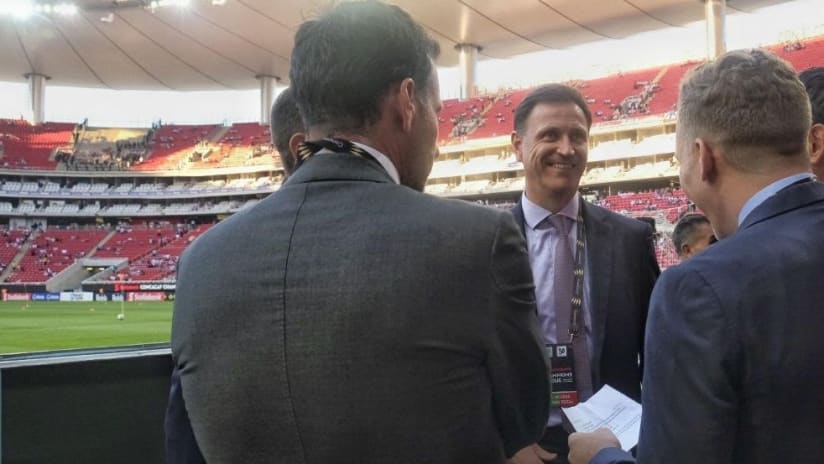Concacaf general secretary Philippe Moggio is pleased with the new format of the Concacaf Champions League, but he told MLSsoccer.com that the confederation is considering tweaks to further enhance the competition in the future.
The 2018 CCL was the first time in the tournament’s 10-year history that it did not include a group stage. Sixteen clubs from the Caribbean and smaller Central American countries participated in the 16-team Concacaf League knockout tournament last fall, with the winner earning a berth to the main, 16-team CCL that concluded last Wednesday with Chivas de Guadalajara defeating Toronto FC to win the title.
“We feel that this edition, the first edition under the new format of the Concacaf Champions League, was really a breakthrough for us,” Moggio said. “I think it proves that the new format has worked because it led to more exciting, meaningful matches across the board. It certainly increased the relevance and attention across the region and we saw that from our ratings and an audience perspective.”
Moggio said the tournament experienced nearly 50-percent year-over-year growth in attendance despite featuring fewer games than the 2016-17 edition. He added that the second leg of the final between TFC and Chivas was the most-watched game on US television in the history of the tournament, averaging 1.5 million viewers on UniMás and UDN.
The tournament was significantly more competitive, as well: Only five of 30 games were decided by three or more goals; in the 2016-17 tournament, 14-of-48 group stage matches were decided by at least that margin and 3-of-14 knockout-round contests were.
The confederation is still considering tweaks to future editions of the tournament, including developing their own disciplinary code for the competition. In the past, FIFA’s disciplinary code has been used as the guideline for the CCL.
According to Moggio, creating a competition-specific disciplinary code could lead to a change in the yellow-card-accumulation suspension rules; currently, players are suspended for one match after accumulating two yellow cards in the competition. Yellow cards don’t reset at any point in the CCL, meaning a player could pick up a second yellow card in his seventh match of the tournament and be suspended for the second leg of the final.
Moggio also said Concacaf would like to eventually implement Video Review into the competition, though he acknowledged it’d be challenging to bring the system to some of the smaller, less technologically-advanced venues used by some Central American and Caribbean teams. He also hinted that it’s possible that Concacaf would consider integrating review in the later rounds of the tournament, possibly only for the semifinal and final.
“[Whether] we implement it in some of the stadiums where we play in the initial stages, that might be a challenge, but it’s certainly something we want to review, and we want to start implementing in our competitions as quickly as possible,” Moggio said. “But I don’t have a specific timeframe to tell you that for certain it would be implemented next season.”
Moggio also said that Concacaf won’t push back the start of the tournament so that it doesn’t begin until after the start of the MLS season; both legs of the Round of 16 this year were held prior to MLS’ opening weekend.
He also indicated that the competition will likely keep its current format of going directly to a penalty-kick shootout if a series is tied after two legs rather than going to extra time.
More important to Moggio than any potential tweaks, however, is the overall arc of the tournament. Concacaf feels the CCL is in a better place than ever before, and Moggio is incredibly bullish on what it might yet become.
“It’s very easy to see what this competition can become,” Moggio said. “I think if we all work together growing our sport across the region, continuing with balanced competition, [aspects of] this can be as big as aspects of the UEFA Champions League. I don’t doubt that for one second. We look at that, we look at the momentum MLS is getting here in the U.S. and internationally, we see how well Liga MX is competing and what they’re doing on the field, we see this competition between the U.S. and Mexico continuing to get more relevant and more visibility. I think you have storylines here and potential that is incredibly interesting.”













